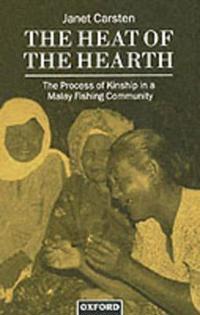
spara 94%
1 säljare
The Heat of the Hearth
Janet Carsten offers a vivid and original investigation of nature and kinship in Malaysia, based on her own experience of life as a fister daughter in a family on the island of Langkawi. Kinship relations are crucial to personal and social identity, and in Malaya culture identity is mutable and fluid: it is given at birth through ties of procreation, but is also aquired throughout life by living together and sharing food. The author shows that the heat of the hearth is not only necessary for the cooking and sharing of food, but central to domestic life, including childbirth and reproduction. Kinship is a process not a state; people become kin largely through the everyday actions of women in and between the households. The incorporation and assimilation of newcomers--`making kinship'--is central to the social reproduction of village communities; domestic life is thus central to the political process. Janet Carsten gives the reader a fascinating `anthropology of everyday life', including a compelling view of gender relations; she urges reassessment of recent anthropological work on gender, and a new approach to the study of kinship.
Utgiven: 1997
ISBN: 9780198280460
Förlag: Clarendon Press
Format: Häftad
Språk: Engelska
Sidor: 330 st
Janet Carsten offers a vivid and original investigation of nature and kinship in Malaysia, based on her own experience of life as a fister daughter in a family on the island of Langkawi. Kinship relations are crucial to personal and social identity, and in Malaya culture identity is mutable and fluid: it is given at birth through ties of procreation, but is also aquired throughout life by living together and sharing food. The author shows that the heat of the hearth is not only necessary for the cooking and sharing of food, but central to domestic life, including childbirth and reproduction. Kinship is a process not a state; people become kin largely through the everyday actions of women in and between the households. The incorporation and assimilation of newcomers--`making kinship'--is central to the social reproduction of village communities; domestic life is thus central to the political process. Janet Carsten gives the reader a fascinating `anthropology of everyday life', including a compelling view of gender relations; she urges reassessment of recent anthropological work on gender, and a new approach to the study of kinship.
Begagnad bok
100 kr1597 krSpara 1497 kr (94%) mot nypris
Fri frakt & skickas inom 1-3 vardagar
Köpskydd med Studentapan
Varje köp täcks av Studentapans köpskydd som säkerställer att boken kommer fram, att du får rätt bok och att skicket stämmer överens med beskrivning.



